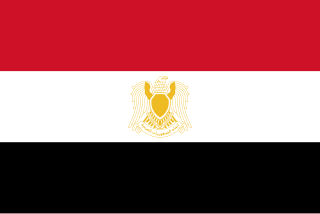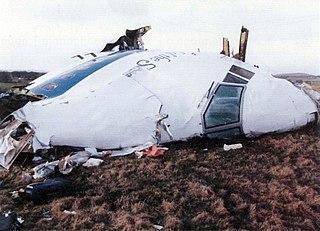| |||||
| Decades: | |||||
|---|---|---|---|---|---|
| See also: | Other events of 1991 List of years in Libya | ||||
The following lists events that happened in 1991 in Libya .
| |||||
| Decades: | |||||
|---|---|---|---|---|---|
| See also: | Other events of 1991 List of years in Libya | ||||
The following lists events that happened in 1991 in Libya .

Libya, officially the State of Libya, is a country in the Maghreb region of North Africa. It borders the Mediterranean Sea to the north, Egypt to the east, Sudan to the southeast, Chad to the south, Niger to the southwest, Algeria to the west, and Tunisia to the northwest, as well as maritime borders with Greece, Italy and Malta to the north. Libya comprises three historical regions: Tripolitania, Fezzan, and Cyrenaica. With an area of almost 1.8 million km2 (700,000 sq mi), it is the fourth-largest country in Africa and the Arab world, and the 16th-largest in the world. Libya claims 32,000 square kilometres of southeastern Algeria, south of the Libyan town of Ghat. The country's official religion is Islam, with 96.6% of the Libyan population being Sunni Muslims. The official language of Libya is Arabic, with vernacular Libyan Arabic being spoken most widely. The majority of Libya's population is Arab. The largest city and capital, Tripoli, is located in northwestern Libya and contains over a million of Libya's seven million people.

The politics of Libya has been in an uncertain state since the collapse of the Libyan Arab Jamahiriya in 2011 and a recent civil war and various jihadists and tribal elements controlling parts of the country.

The foreign relations of Libya under Muammar Gaddafi (1969–2011) underwent much fluctuation and change. They were marked by severe tension with the West and by other national policies in the Middle East and Africa, including the Libyan government's financial and military support for numerous paramilitary and rebel groups.

Muammar Muhammad Abu Minyar al-Gaddafi was a Libyan revolutionary, politician and political theorist who ruled Libya from 1969 until his assassination by rebel forces in 2011. He came to power through a military coup, first becoming Revolutionary Chairman of the Libyan Arab Republic from 1969 to 1977 and then the 'Brotherly Leader' of the Great Socialist People's Libyan Arab Jamahiriya from 1977 to 2011. Initially ideologically committed to Arab nationalism and Nasserism, Gaddafi later ruled according to his own Third International Theory.
Nazih Abdul-Hamed Nabih al-Ruqai'i, known by the alias Abu Anas al-Libi, was a Libyan under indictment in the United States for his part in the 1998 United States embassy bombings. He worked as a computer specialist for al-Qaeda. He was an ethnic Libyan, born in Tripoli.

The HIV trial in Libya concerns the trials, appeals and eventual release of six foreign medical workers charged with conspiring to deliberately infect over 400 children with HIV in 1998, causing an epidemic at El-Fatih Children's Hospital in Benghazi, Libya. About 56 of the infected children had died by August 2007. The total number of victims rose to 131 in 2022.

The Libya national football team represents Libya in men's international association football and it is controlled by the Libyan Football Federation. The team has never qualified for FIFA World Cup but has qualified for editions of the Africa Cup of Nations in 1982, 2006, and 2012. In 1982, the team was both the host and runner-up. In the Arab Cup, Libya finished second in 1964 and 2012, and third in 1966. The team is affiliated with both FIFA and Confederation of African Football (CAF).

Saif al-Islam Muammar al-Gaddafi is a Libyan political figure. He is the second son of the late Libyan leader Muammar Gaddafi and his second wife Safia Farkash. He was a part of his father's inner circle, performing public relations and diplomatic roles on his behalf. He publicly turned down his father's offer of the country's second highest post and held no official government position. According to United States Department of State officials in Tripoli, during his father's reign, he was the second most widely recognized person in Libya, being at times the de facto prime minister, and was mentioned as a possible successor, though he rejected this. An arrest warrant was issued for him on 27 June 2011 by the International Criminal Court (ICC) for charges of crimes against humanity against the Libyan people, for killing and persecuting civilians, under Articles 7(1)(a) and 7(1)(h) of the Rome statute. He denied the charges.

The Federation of Arab Republics was an unsuccessful attempt by Muammar Gaddafi to merge Libya, Egypt and Syria in order to create a unified Arab state. Although approved by a referendum in each country on 1 September 1971, the three countries disagreed on the specific terms of the merger. The federation lasted from 1 January 1972 to 19 November 1977.

Abdelbaset Ali Mohamed al-Megrahi was a Libyan who was head of security for Libyan Arab Airlines, director of the Centre for Strategic Studies in Tripoli, Libya, and an alleged Libyan intelligence officer. On 31 January 2001, Megrahi was convicted, by a panel of three Scottish judges sitting in a special court at Camp Zeist in the Netherlands, of 270 counts of murder for the bombing of Pan Am Flight 103 over Lockerbie, Scotland, on 21 December 1988 and was sentenced to life imprisonment. His co-accused, Lamin Khalifah Fhimah, was found not guilty and was acquitted.
The Pan Am Flight 103 bombing trial began on 3 May 2000, more than 11 years after the destruction of Pan Am Flight 103 on 21 December 1988. The 36-week bench trial took place at a specially convened Scottish Court in the Netherlands set up under Scots law and held at a disused United States Air Force base called Camp Zeist near Utrecht.

Baghdadi Ali Mahmudi is a Libyan politician who was Secretary of the General People's Committee of Libya from 5 March 2006 to as late as 1 September 2011, when he acknowledged the collapse of the GPCO and the ascendance of the National Transitional Council as a result of the Libyan Civil War. He has a medical degree, specialising in obstetrics and gynecology, and had served as Deputy Prime Minister to Prime Minister Shukri Ghanem since 2003 at the time he was appointed to replace him. He was a part of Gaddafi's inner circle at least prior to his escape in mid-2011. He was arrested in Tunisia for illegal border entry and jailed for six months, although this was later overruled on appeal, however a Tunisian court decided to extradite Mahmoudi to Libya under a request from Libya's Transitional Council.

Pan Am Flight 103 (PA103/PAA103) was a regularly scheduled Pan Am transatlantic flight from Frankfurt to Detroit via a stopover in London and another in New York City. The transatlantic leg of the route was operated by Clipper Maid of the Seas, a Boeing 747 registered N739PA. Shortly after 19:00 on 21 December 1988, while the aircraft was in flight over the Scottish town of Lockerbie, it was destroyed by a bomb, killing all 243 passengers and 16 crew in what became known as the Lockerbie bombing. Large sections of the aircraft crashed in a residential street in Lockerbie, killing 11 residents. With a total of 270 fatalities, it is the deadliest terrorist attack in the history of the United Kingdom.

Al-Ahly Sports Cultural and Social Club, known as Al-Ahly SCSC, is a Libyan sports club based in Benghazi. Al-Ahly SC has its roots in a political party, the Omar al Mukhtar society.

Sirte, also spelled Sirt, Surt, Sert or Syrte, is a city in Libya. It is located south of the Gulf of Sirte, almost right in the middle between Tripoli and Benghazi. It is famously known for its battles, ethnic groups and loyalty to former Libyan ruler Muammar Gaddafi. Due to developments in the First Libyan Civil War, it was briefly the capital of Libya as Tripoli's successor after the Fall of Tripoli from 1 September to 20 October 2011. The settlement was established in the early 20th century by the Italians, at the site of a 19th-century fortress built by the Ottomans. It grew into a city after World War II.

Luis Moreno Ocampo is an Argentine lawyer who served as the first prosecutor of the International Criminal Court (ICC) from 2003 to 2012. Previously, he had played a major role in Argentina's democratic transition (1983–1991).

Mustafa Abdul Jalil is a Libyan politician who was the Chairman of the National Transitional Council from 5 March 2011 until its dissolution on 8 August 2012. This position meant he was de facto head of state during a transitional period after the fall of Muammar Gaddafi's government in the Libyan Civil War, and until the handover of power to the General National Congress.
Abdullah Senussi is a Libyan national who was the intelligence chief and brother-in-law of former Libyan leader Colonel Muammar Gaddafi. He was married to Gaddafi's sister-in-law.

The foreign relations of Libya were largely reset at the end of the Libyan Civil War, with the overthrow of Muammar Gaddafi and the Second Libyan Civil War. The current Minister of Foreign Affairs since 15 March 2021 is Najla Mangoush. Although many foreign embassies in Tripoli closed down in 2014 due to the conflict in Libya from 2011 onwards, by the end of 2017 thirty diplomatic missions had reopened in the Libyan capital.

The Libyan civil war (2014–2020), also known as the Second Libyan Civil War, was a multilateral civil war which was fought in Libya among a number of armed groups, but mainly the House of Representatives (HoR) and the Government of National Accord (GNA), for six years from 2014 to 2020.